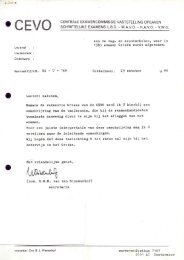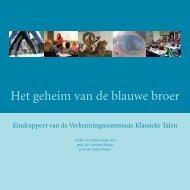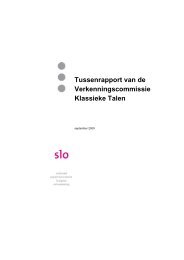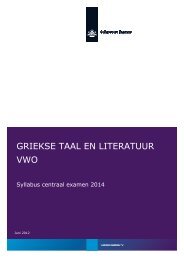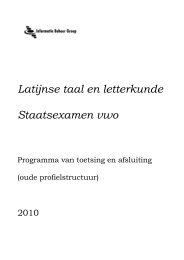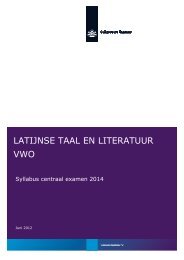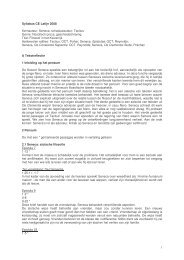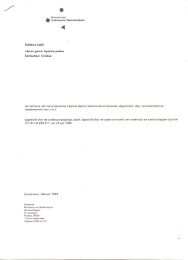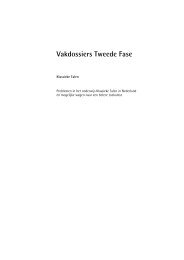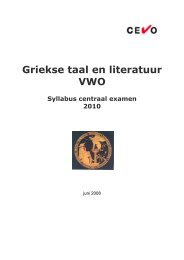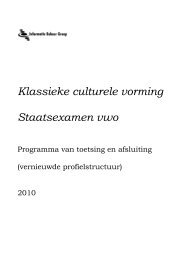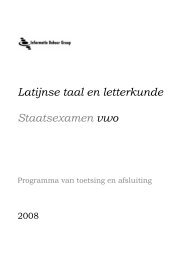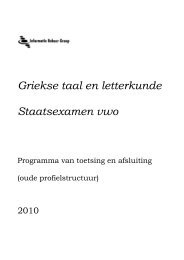Rome Wasn't Digitized in a Day - Council on Library and Information ...
Rome Wasn't Digitized in a Day - Council on Library and Information ...
Rome Wasn't Digitized in a Day - Council on Library and Information ...
Create successful ePaper yourself
Turn your PDF publications into a flip-book with our unique Google optimized e-Paper software.
4<br />
associati<strong>on</strong>s to work together, <strong>and</strong> the need for scholars to give up obsess<str<strong>on</strong>g>in</str<strong>on</strong>g>g over “slavish” tasks <strong>and</strong><br />
return to the more important work of humanistic <str<strong>on</strong>g>in</str<strong>on</strong>g>terpretati<strong>on</strong> of sources, still r<str<strong>on</strong>g>in</str<strong>on</strong>g>g true.<br />
More than 30 years later, J. D. Bolter offered a detailed analysis of how <strong>on</strong>e feature of the Internet—<br />
hypertext—offered great new potential for record<str<strong>on</strong>g>in</str<strong>on</strong>g>g <strong>and</strong> present<str<strong>on</strong>g>in</str<strong>on</strong>g>g scholarship (Bolter 1991). Bolter<br />
c<strong>on</strong>tended that studies for the past two centuries had been def<str<strong>on</strong>g>in</str<strong>on</strong>g>ed by the qualities of the pr<str<strong>on</strong>g>in</str<strong>on</strong>g>ted book<br />
where the ma<str<strong>on</strong>g>in</str<strong>on</strong>g> goal of scholarship had been to “to fix each text of each ancient author: to determ<str<strong>on</strong>g>in</str<strong>on</strong>g>e<br />
the authenticity of works ascribed to an author <strong>and</strong> for each work to establish the Urtext—what the<br />
author actually wrote, letter for letter.” This is the essential work of a classical philologist or creator of<br />
a critical editi<strong>on</strong>: to study all the extant manuscripts of an author, to “rec<strong>on</strong>struct” a text, <strong>and</strong> then to<br />
list all the text variants (or at least the most important) found <str<strong>on</strong>g>in</str<strong>on</strong>g> the orig<str<strong>on</strong>g>in</str<strong>on</strong>g>al sources with explanati<strong>on</strong>s<br />
<str<strong>on</strong>g>in</str<strong>on</strong>g> an apparatus criticus. While postmodern literary theory had challenged the ideal of the Urtext <str<strong>on</strong>g>in</str<strong>on</strong>g><br />
many discipl<str<strong>on</strong>g>in</str<strong>on</strong>g>es, Bolter submitted, classical studies had rema<str<strong>on</strong>g>in</str<strong>on</strong>g>ed largely unaffected. N<strong>on</strong>etheless,<br />
Bolter believed that the nature of hypertext was affect<str<strong>on</strong>g>in</str<strong>on</strong>g>g how classicists perceived the nature of their<br />
texts. “Hypertext now challenges the Urtext not <str<strong>on</strong>g>in</str<strong>on</strong>g> the jarg<strong>on</strong> of postmodern theory,” he expla<str<strong>on</strong>g>in</str<strong>on</strong>g>ed,<br />
“but practically <strong>and</strong> visibly <str<strong>on</strong>g>in</str<strong>on</strong>g> the way that it h<strong>and</strong>les text.” Hypertext, he posited, might lead scholars<br />
to focus less <strong>on</strong> establish<str<strong>on</strong>g>in</str<strong>on</strong>g>g an exact Urtext <strong>and</strong> more <strong>on</strong> explor<str<strong>on</strong>g>in</str<strong>on</strong>g>g the c<strong>on</strong>necti<strong>on</strong>s between texts to<br />
“emphasize the c<strong>on</strong>t<str<strong>on</strong>g>in</str<strong>on</strong>g>uity between the ancient text <strong>and</strong> its ancient, medieval, <strong>and</strong> modern<br />
<str<strong>on</strong>g>in</str<strong>on</strong>g>terpretati<strong>on</strong>s.” The need for digital editi<strong>on</strong>s to reflect a more sophisticated traditi<strong>on</strong> of textual<br />
transmissi<strong>on</strong> <strong>and</strong> textual variati<strong>on</strong> is a theme that is echoed throughout the literature of digital classics.<br />
An even more extensive explorati<strong>on</strong> of how new technologies might affect the discipl<str<strong>on</strong>g>in</str<strong>on</strong>g>e of classics<br />
was provided by Karen Ruhleder (Ruhleder 1995), albeit with an exclusive focus <strong>on</strong> the TLG. One<br />
challenge Ruhleder underscored was that “humanists themselves have been more <str<strong>on</strong>g>in</str<strong>on</strong>g>terested <str<strong>on</strong>g>in</str<strong>on</strong>g> apply<str<strong>on</strong>g>in</str<strong>on</strong>g>g<br />
comput<str<strong>on</strong>g>in</str<strong>on</strong>g>g technologies to their work <str<strong>on</strong>g>in</str<strong>on</strong>g> detailed studies of the impact of comput<str<strong>on</strong>g>in</str<strong>on</strong>g>g technologies <strong>on</strong><br />
their discipl<str<strong>on</strong>g>in</str<strong>on</strong>g>es.” Christ<str<strong>on</strong>g>in</str<strong>on</strong>g>e Borgman echoes this criticism <str<strong>on</strong>g>in</str<strong>on</strong>g> her recent exam<str<strong>on</strong>g>in</str<strong>on</strong>g>ati<strong>on</strong> of the digital<br />
humanities (Borgman 2009). Ruhleder surveyed how us<str<strong>on</strong>g>in</str<strong>on</strong>g>g the TLG had affected the daily work of<br />
classicists, how it had changed their relati<strong>on</strong>ship to the textual materials they used, <strong>and</strong> how it affected<br />
both social relati<strong>on</strong>s am<strong>on</strong>g classicists <strong>and</strong> their discipl<str<strong>on</strong>g>in</str<strong>on</strong>g>ary <str<strong>on</strong>g>in</str<strong>on</strong>g>frastructures. She c<strong>on</strong>ducted 60<br />
unstructured <str<strong>on</strong>g>in</str<strong>on</strong>g>terviews with classicists <strong>and</strong> c<strong>on</strong>centrated <strong>on</strong> work <str<strong>on</strong>g>in</str<strong>on</strong>g> literary scholarship <strong>and</strong> textual<br />
criticism. Ruhleder observed that the work of classical scholarship was often like detective work, <strong>and</strong><br />
that scholars’ questi<strong>on</strong>s typically <str<strong>on</strong>g>in</str<strong>on</strong>g>cluded “manuscript authorship <strong>and</strong> authenticity, social relati<strong>on</strong>ships<br />
between different groups or classes <str<strong>on</strong>g>in</str<strong>on</strong>g> ancient Greek society, <strong>and</strong> the different mean<str<strong>on</strong>g>in</str<strong>on</strong>g>gs of a word or<br />
phrase over time.” Classical scholars used analytical techniques to weigh <strong>and</strong> <str<strong>on</strong>g>in</str<strong>on</strong>g>terpret evidence <strong>and</strong><br />
used tools “to locate particular pieces of evidence with<str<strong>on</strong>g>in</str<strong>on</strong>g> texts,” Ruhleder noted. As Bolter expla<str<strong>on</strong>g>in</str<strong>on</strong>g>ed<br />
previously, the nature of textual evidence for classicists is complicated because materials are often<br />
fragmentary or questi<strong>on</strong>able, their transmissi<strong>on</strong> is disputable, <strong>and</strong> the “rec<strong>on</strong>structi<strong>on</strong> of the orig<str<strong>on</strong>g>in</str<strong>on</strong>g>al, or<br />
urtext, is an important primary activity with<str<strong>on</strong>g>in</str<strong>on</strong>g> classical scholarship.”<br />
While the TLG did offer amaz<str<strong>on</strong>g>in</str<strong>on</strong>g>g new search<str<strong>on</strong>g>in</str<strong>on</strong>g>g opportunities as well as both breadth <strong>and</strong> depth of<br />
material, Ruhleder criticized its unexam<str<strong>on</strong>g>in</str<strong>on</strong>g>ed use by classicists. The TLG uses <strong>on</strong>e “best editi<strong>on</strong>”<br />
chosen by a special committee of the American Philological Associati<strong>on</strong> (APA) 10 for each Greek<br />
author <strong>and</strong> <str<strong>on</strong>g>in</str<strong>on</strong>g>cludes no commentaries or apparatus criticus, a practice challenged by Ruhleder:<br />
The TLG has altered not <strong>on</strong>ly the form (book to electr<strong>on</strong>ic medium) but also the c<strong>on</strong>tent <strong>and</strong> the<br />
organizati<strong>on</strong> of materials presented <str<strong>on</strong>g>in</str<strong>on</strong>g> the package. It <str<strong>on</strong>g>in</str<strong>on</strong>g>cludes neither critical notes nor other<br />
10 http://www.apaclassics.org/



